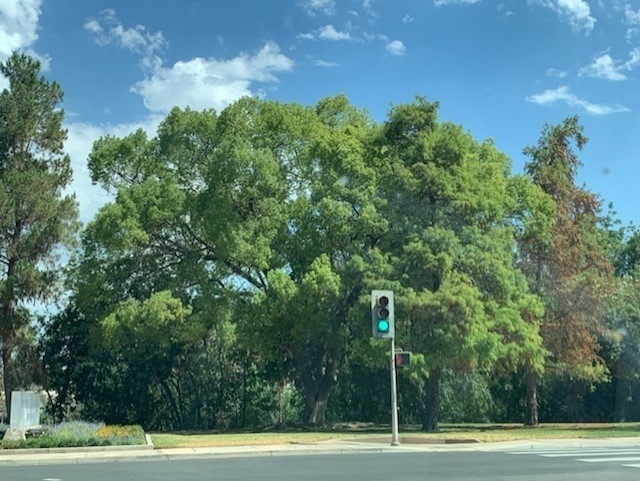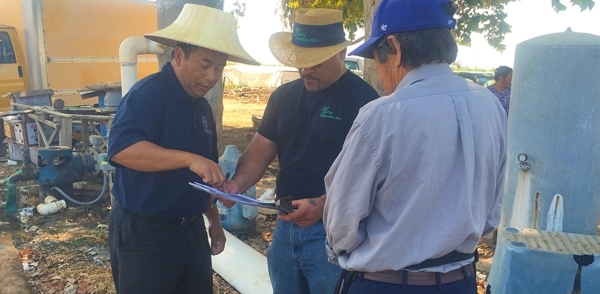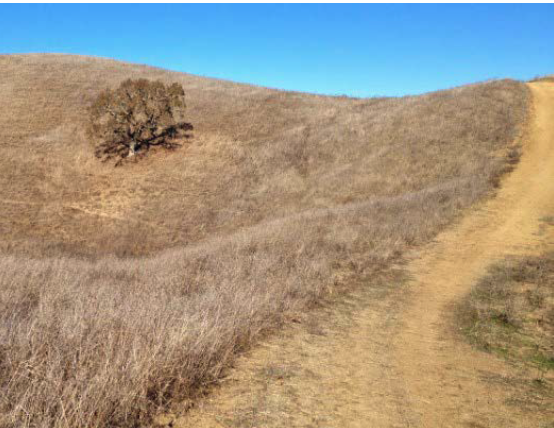Posts Tagged: Project Learning Tree
Lawn-pocalypse! Surviving Drought
Ah, summer! The season of sunburns, pool parties, and… lawn droughts. If your once lush, green carpet now looks like a crunchy brown doormat, you're not alone. Let's dive into why your yard is staging a dramatic death scene and what you can do to...

Bermuda grass and weeds overtaking drought stressed turf grass.
Climate-Change Resources
University of California UC ANR Green Blog (Climate Change and Other Topics) https://ucanr.edu/blogs/Green/index.cfm?tagname=climate%20change (full index)
Examples:
- Save Trees First: Tips to Keep Them Alive Under Drought https://ucanr.edu/b/~CdD
- Landscaping with Fire Exposure in Mind: https://ucanr.edu/b/~G4D
- Cities in California Inland Areas Must Make Street Tree Changes to adapt to Future Climate https://ucanr.edu/b/~oF7
Drought, Climate Change and California Water Management Ted Grantham, UC Cooperative Extension specialist (23 minutes) https://youtu.be/dlimj75Wn9Q
Climate Variability and Change: Trends and Impacts on CA Agriculture Tapan Pathak, UC Cooperative Extension specialist (24 minutes) https://youtu.be/bIHI0yqqQJc
California Institute for Water Resources (links to blogs, talks, podcasts, water experts, etc.) https://ciwr.ucanr.edu/California_Drought_Expertise/
UC ANR Wildfire Resources (publications, videos, etc.) https://ucanr.edu/News/For_the_media/Press_kits/Wildfire/ (main website)
-UC ANR Fire Resources and Information https://ucanr.edu/sites/fire/ (main website)
-Preparing Home Landscaping https://ucanr.edu/sites/fire/Prepare/Landscaping/
UC ANR Free Publications https://anrcatalog.ucanr.edu/ (main website)
- Benefits of Plants to Humans and Urban Ecosystems: https://anrcatalog.ucanr.edu/pdf/8726.pdf
-Keeping Plants Alive Under Drought and Water Restrictions (English version) https://anrcatalog.ucanr.edu/pdf/8553.pdf
(Spanish version) https://anrcatalog.ucanr.edu/pdf/8628.pdf
- Use of Graywater in Urban Landscapes https://anrcatalog.ucanr.edu/pdf/8536.pdf
- Sustainable Landscaping in California https://anrcatalog.ucanr.edu/pdf/8504.pdf
Other (Non-UC) Climate Change Resources
Urban Forests and Climate Change. Urban forests play an important role in climate change mitigation and adaptation. Active stewardship of a community's forestry assets can strengthen local resilience to climate change while creating more sustainable and desirable places to live. https://www.fs.usda.gov/ccrc/topics/urban-forests
Examining the Viability of Planting Trees to Mitigate Climate Change (plausible at the forest level) https://climate.nasa.gov/news/2927/examining-the-viability-of-planting-trees-to-help-mitigate-climate-change/
Reports and other information resources coordinated under the auspices of the United Nations and produced through the collaboration of thousands of international scientists to provide a clear and up to date view of the current state of scientific knowledge relevant to climate change. United Nations Climate Action
Scientific reports, programs, action movements and events related to climate change. National Center for Atmospheric Research (National Science Foundation)
Find useful reports, program information and other documents resulting from federally funded research and development into the behavior of the atmosphere and related physical, biological and social systems. Search and find climate data from prehistory through to an hour ago in the world's largest climate data archive. (Formerly the "Climatic Data Center") National Centers for Environmental Information (NOAA)
Think tank providing information, analysis, policy and solution development for addressing climate change and energy issues (formerly known as the: "Pew Center on Global Climate Change"). Center for Climate & Energy Solutions (C2ES)
Mapping Resilience: A Blueprint for Thriving in the Face of Climate Disaster. The Climate Adaptation Knowledge Exchange (CAKE) was launched in July 2010 and is managed by EcoAdapt, a non-profit with a singular mission: to create a robust future in the face of climate change by bringing together diverse players to reshape planning and management in response to rapid climate change. https://www.cakex.org/documents/mapping-resilience-blueprint-thriving-face-climate-disaster
Cal-Adapt provides a way to explore peer-reviewed data that portrays how climate change might affect California at the state and local level. We make this data available through downloads, visualizations, and the Cal-Adapt API for your research, outreach, and adaptation planning needs. Cal-Adapt is a collaboration between state agency funding programs, university and private sector researchers https://cal-adapt.org/
Find reports, maps, data and other resources produced through a confederation of the research arms of 13 Federal departments and agencies that carry out research and develop and maintain capabilities that support the Nation's response to global change. Global Change (U.S. Global Change Research Program)
The Pacific Institute is a global water think tank that combines science-based thought leadership with active outreach to influence local, national, and international efforts to develop sustainable water policies. https://pacinst.org/our-approach/
Making equity real in climate adaptation and community resilience policies and programs: a guidebook. https://greenlining.org/publications/2019/making-equity-real-in-climate-adaption-and-community-resilience-policies-and-programs-a-guidebook/
Quarterly CA Climate Updates and CA Drought Monitor Maps (updated each Thursday) https://www.drought.gov/documents/quarterly-climate-impacts-and-outlook-western-region-june-2022
Project Learning Tree: Shaping the future of California forests
On this International Day of Forests, we at UC Cooperative Extension Forest Research and Outreach invite you to celebrate the future of California's trees with us. Considering the recent news coverage regarding tree mortality in California, we want to instead view this subject through a lens of hope. For it's not just the news outlets witnessing the extent of forest die-off: children, especially those in forested communities, are seeing the effects of drought, wildfire, and fire suppression policies in real time.
Project Learning Tree is a national education program leading the next generation to witness and then act on these changes. Children are the future of our forests, and we think the efforts of Project Learning Tree are a cause for celebration, don't you?
Last month, Californians may have noticed a marked uptick in the news coverage of the state's forests. Local, state and national news outlets all reported on the startling approximation of 36 million trees that perished between 2021 and 2022. This number, gleaned from USDA Forest Service data, is a startling jump from the 9.5 million trees that perished the year before. The future of California's forests does not have to look like this, with large fluctuations and ever-rising numbers of dying trees. Right now, it's not easy being a tree. In 10 or 20 years? We're hopeful that the situation is different.
Project Learning Tree (PLT), stretches across the nation to connect students to forests, even if they live miles away from one. Jonelle Mason, the PLT coordinator for Northern California region, provided more insight into the program's purpose through a sentiment many may be familiar with: “To quote Jane Goodall, ‘Only if we understand, will we care. Only if we care, we will help.'” Project Learning Tree is one piece in the future of forest stewardship, and as Jonelle sees it, “Forming forest-education generations creates passionate advocates. People can't save what they don't know about.”
A point touched on by nearly all news outlets covering tree mortality was the centuries of fire suppression practices and its ripple effects that amplify drought and wildfire damage. Students in California are aware of natural disasters affecting forests and forested communities, but not necessarily the causes.Mason posits that in closing that knowledge gap, PLT can “cultivate environmental defenders [who] will ultimately push us in the right direction.”
A crucial aspect of Project Learning Tree is that it exists as a continuing education program, meant to follow students from kindergarten to senior year of high school. Each year of learning builds upon the last, yet the topics are given nuance and depth even at the elementary school level. For instance, PLT's flagship K-8 curriculum gives second grade teachers the tools to communicate ecosystem services, plant structure and natural resource cultivation. High school teachers following the “Focus on Forests” education guide will find avenues to introduce concepts like environmental policy, and will help students understand the difficult decisions that many forest landowners face.
It does indeed give us a reason to celebrate the future. Young people are more active in the conversations surrounding the environment and climate change, and are aware that something must be done to protect the natural resources they have left. It's vital to translate that passion and interest into true learning, where a classroom can become the space for developing ideas for what can be done about our state's forests. Mason is quick to point out the core tenant of PLT that makes it unique: “Teaching students how to think, not what to think, about environmental concerns.”
Project Learning Tree presents concepts to students and gives them the tools to think critically through the many fields that touch forests, from the natural sciences to philosophy. California's youth has a vested interest in protecting and managing their forests, and programs like PLT give us hope that the interest can truly be translated to action.
If you are interested in bringing Project Learning Tree to your school or home, you can contact Mason at jmason@ucanr.edu.
Drought focus of Water Resources IMPACT magazine special issue
UC ANR experts address emotional toll of drought
Preparing the American West for prolonged drought is the focus of a double issue of Water Resources IMPACT magazine. The California Water Commission staff are guest editors for this special open-access edition of the magazine, which is published by the American Water Resources Association.
Faith Kearns, academic coordinator of University of California Agriculture and Natural Resources' California Institute for Water Resources, is among the authors delving into how drought impacts people and the environment and how we can better prepare for the inevitable.
The first issue, published on Feb. 14, focuses on water scarcity issues confronting California and the ways these issues affect different sectors.
In “Trauma, Care, and Solidarity: Addressing the Emotional Toll of Chronic Drought,” Kearns highlights the effects of drought on mental health. She points to the spike in suicide hotline calls when wells ran dry in Southeast Asian communities in California's Central Valley.
By listening to Southeast Asian farmers, Ruth Dahlquist-Willard and Michael Yang of UC Cooperative Extension were able to “lighten the load” for them by providing pragmatic support, Kearns writes.
“The scale of some of these highly emotional issues – drought, wildfires, climate change – can make them seem incredibly difficult, if not impossible, to deal with,” Kearns said. “At the same time, they are affecting everyone living in the western U.S. on a daily basis. I wanted to highlight and provide models based on work that people – whether they are researchers, clinical psychologists, or Cooperative Extension advisors – are doing right now to ease the way.”
The authors who contributed to the double issue are a diverse array of Tribal experts, academics, nongovernmental organization thought-leaders, water managers and water policy influencers, each of whom brings their own perspective on the topic of drought. Their expertise and perspectives in climate science, water policy and water management will help inform drought-related decision-making and support policies that better prepare the state to thrive during periods of prolonged water scarcity.
In addition to Kearns, the first issue includes articles contributed by:
- Samantha Stevenson, University of California, Santa Barbara
- Jay Lund, University of California, Davis
- Ron Goode, North Fork Mono Tribe
- Andy Fecko, Placer County Water Agency
- Jeff Mount, Public Policy Institute of California, and Ted Grantham, University of California, Berkeley/UC Cooperative Extension
- Nat Seavy and Karyn Stockdale, National Audubon Society
- Kjia Rivers, Community Water Center
- Cannon Michael, Bowles Farming
- Michelle Reimers, Turlock Irrigation District
The January/February edition of Water Resources IMPACT magazine can be accessed, free of charge, on the American Water Resources Association website at https://www.awra.org under “Publications.”
The second issue, to be published in March, will focus on drought response, considering the options for adaptation. This two-part series complements the Commission's work on strategies to protect communities and fish and wildlife in the event of a long-term drought.
New Additions to Bohart Museum Open House on Beetles
A Cal Fire display of bark beetles and a children's activity by Project Learning Tree California are among the newly announced additions to the Bohart Museum of Entomology's open house on beetles, set from 1 to 4 p.m., Sunday, Jan. 22 in Room 1124 of the...

Project Learning Tree (PLT) California aims to "use trees and forests as windows on the world to increase students' understanding of the environment and actions they can take to conserve it."

Cal Fire senior environmental specialist Curtis Ewing examining a coast live oak with cankers and flatheaded borer damage.






